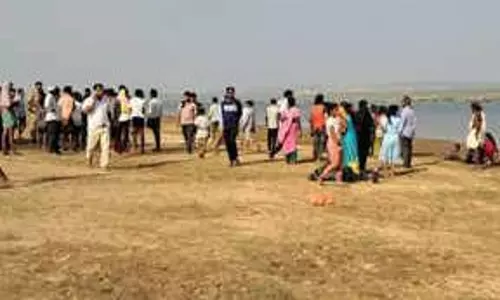
Keeping doors closed against Covid-19
text_fieldsThe detection of Covid-19 cases within Kerala itself is a reminder that it is not only the authorities but the society in general and individuals who should reinforce their alertness. The world has come to realise that the spread of coronavirus in China, where it was first detected, and from there to the rest of the world was mostly due to the initial lack of vigilance. What makes the virus alarming is its capacity to spread fast. With the attempts to stem the cotagion in China, it did recede too; but it has been infecting victims in various other parts of the world as well.
Reports speak of Covid-19 having hit 92 countries, forcing restrictions in many parts. Travel curbs have been introduced in several places including the Gulf countries, and there is a temporary ban on internatinal pilgrimage too. In India, 34 people have tested positive and in some regions, schools are closed. Although the first case of Covid-19 in India was confirmed in Kerala, thanks to the observation, care and state of alertness of the authorities, the state was able to survive it. But, probably for want of vigilance, infection has occurred again here. There is also a scare of monkey fever in Wayanad. The reputation of 'Kerala Model', which was effective with interventions against new pandemics, is bound to fade with the slackness of just a few. What create problems are factors ranging from ignorance about preventive protocol to the cavalier attitude that law is to be obeyed only when convenient.
There were reports earlier that some travellers, who were likely to be carriers of the corona virus, left for abroad disregarding the advice of the authorities. And now, some who arrived in Kerala from the virus-hit Italy, as Health Minister KK Shylaja informs, failed to inform their origin of journey to those in charge, resulting in the virus spreading to their relatives. Given the fact that the only defence against the affliction is to prevent its transmission, it is nothing short of irresponsibility to ignore warnings and guidelines. Awareness creation about this has to start from within households itself. Even if 99 out of 100 remain alert, a single person going slack is enough to open the door to the disease. The public should first be aware that failure to observe the protocol in this regard will amount to anti-social act. Incidents from international travel to social functions will leave room for infection. As a habit, Keralites are in the forefront of having social interactions and foreign travel. For this very reason, complying with protocol and restrictions, even at the cost of minor inconveniences, constitute a crucial civil obligation. The World Health Organization (WHO) had issued clear guidelines for this two months ago. It is upto the authorities to ensure that the people are familiar with essential protective measures during public functions, travel etc, including what fellow human beings have actually been infected. We have the most important lesson before us that the prime reason for the disease turning a pandemic is the failure to inform authorities on the part of those affected by the disaease and those suspected to be so.
Personal hygiene and sanitation of surroundings are of key importance. Since the infection spreads mostly through touch, WHO advises people to be in the habit of frequently washing hands with anti-septic lotions. Covid-19 is a disease that can easily be beaten through prevention, but on the contrary will spread fast in the absence of prevention; hence the advice that those likely to be infected (even if they have not become a victim) should immediately approach the health workers. And it is the violation of this direction that led to the relapse of the disease in Kerala. The laxity of individuals will endanger the society. No less important is the environmental measures to be taken by governments on a long-term basis. The same alertness with which governments step in with awareness drives on the arrival of the disease, should be shown in the matter of cleanliness of environment. Experts point out that a big role is played by the atmosphere, water, soil and surfaces used by human beings in the transmission of virus. A common point talked about is the transmission of virus from animals to humans and then between humans. But what remains outside the scope of such discourse is the environmental factor that sets the stage for the contraction of new germs and their spread. Many decayed ingredients of ecology turn originators of germs. And many virus are capable of existing without human or animal carriers even. Their capacity to survive may be derived from factors ranging from atmospheric temperature to the scale of presence of ultraviolet rays in sunlight. Some molecules of the corona virus family can survive on surfaces outside the human body upto a week. 'Sars' virus will survive in the air for two weeks. All of which underline the importance of hygiene in daily life. Research is stillon going about the measures required against new viruses in workplaces and households. Studies so far strictly emphasise cleanliness and vigil. Neither authorities nor the people have an option to ignore these factors.























